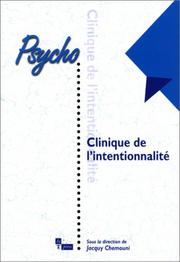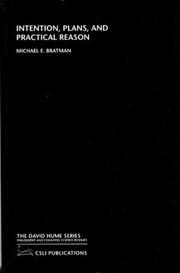| Listing 1 - 10 of 14 | << page >> |
Sort by
|

ISBN: 2912404592 9782912404596 Year: 2001 Publisher: Paris : In Press Ed.,
Abstract | Keywords | Export | Availability | Bookmark
 Loading...
Loading...Choose an application
- Reference Manager
- EndNote
- RefWorks (Direct export to RefWorks)
Clinical psychology. --- Intentionalism. --- Psychologie clinique --- Intentionnalité (Psychologie) --- Intentionnalité (Psychologie)
Book
Year: 1970 Publisher: London : Methuen,
Abstract | Keywords | Export | Availability | Bookmark
 Loading...
Loading...Choose an application
- Reference Manager
- EndNote
- RefWorks (Direct export to RefWorks)
Intention (Logic) --- Intentionalism --- Intention (Logique) --- Intentionnalité (Psychologie)

ISBN: 1575861925 Year: 1999 Publisher: Stanford, Calif. : Center for the Study of Language and Information,
Abstract | Keywords | Export | Availability | Bookmark
 Loading...
Loading...Choose an application
- Reference Manager
- EndNote
- RefWorks (Direct export to RefWorks)
Intentionalism --- Planning --- Intentionnalité (Psychologie) --- Planification --- Agent (Philosophy) --- Intentionality (Philosophy) --- Practical reason. --- Agent (Philosophy). --- Intentionality (Philosophy). --- Intentionnalité (Psychologie)
Book
ISBN: 3884050176 9783884050170 Year: 1982 Publisher: Munchen Philosophia Verlag
Abstract | Keywords | Export | Availability | Bookmark
 Loading...
Loading...Choose an application
- Reference Manager
- EndNote
- RefWorks (Direct export to RefWorks)
Object (Philosophy) --- Act (Philosophy) --- Intentionalism. --- Objet (Philosophie) --- Action (Philosophie) --- Intentionnalité (Psychologie) --- Presentation (Philosophy) --- Intentionalism --- Act psychology --- Action psychology --- Psychology --- Action (Philosophy) --- Agent (Philosophy) --- Philosophy --- Intentionnalité (Psychologie)
Book
Year: 1956 Publisher: Paris : E. Vitte,
Abstract | Keywords | Export | Availability | Bookmark
 Loading...
Loading...Choose an application
- Reference Manager
- EndNote
- RefWorks (Direct export to RefWorks)
Intentionalism --- Phenomenology --- Intentionnalité (Psychologie) --- Phénoménologie --- Husserl, Edmund, --- Thomas, --- Brentano, Franz,
Book
Abstract | Keywords | Export | Availability | Bookmark
 Loading...
Loading...Choose an application
- Reference Manager
- EndNote
- RefWorks (Direct export to RefWorks)
Intentionalism --- Goal (Psychology) --- Intentionnalité (Psychologie) --- But (Psychologie) --- Behavior. --- Goals. --- Act psychology --- Action psychology --- Psychology --- Goal setting --- Setting of goals --- Motivation (Psychology) --- Goal --- Intention --- Acceptance Process --- Acceptance Processes --- Behaviors --- Process, Acceptance --- Processes, Acceptance --- Intentionnalité (Psychologie) --- Behavior --- Goals
Book
ISBN: 221301308X 9782213013084 Year: 1983 Publisher: Paris Fayard
Abstract | Keywords | Export | Availability | Bookmark
 Loading...
Loading...Choose an application
- Reference Manager
- EndNote
- RefWorks (Direct export to RefWorks)
Le mouvement semble l'expression la plus immédiate, la plus évidente de ce qui vit. C'est par lui qu'on a coutume de distinguer l'animé de l'inanimé. Par l'étude du mouvement, le physiologiste pénètre à l'intérieur du vivant, vers la source cachée de l'action. Jusqu'où peut-on être objectif en ce domaine ? Peut-on matérialiser l'étape psychique au cours de laquelle se décide, se prépare puis se déclenche l'action ? Le cerveau n'est-il qu'une machine à réagir, ou bien une "machine intelligente" qui non seulement se construit et se contrôle, mais organise son propre environnement ? Marc Jeannerod, professeur de physiologie à l'Université Claude Bernard de Lyon, auteur de nombreux travaux expérimentaux sur le fonctionnement du système nerveux, amorce ici une théorie de l'action et de la volonté, de la représentation et du comportement.
Brain --- Will --- Intentionalism --- Clinical neuropsychology --- Cerveau --- Volonté --- Intentionnalité (Psychologie) --- Neuropsychologie clinique --- Physiology --- Physiological aspects --- Physiologie --- Aspect psychologique --- physiology --- Neurophysiologie --- Activité motrice --- Volonté --- Intentionnalité (Psychologie) --- Neurophysiologie. --- Activité motrice. --- Volonté. --- Physiologie.
Book
ISBN: 2130456448 9782130456445 Year: 1993 Volume: 2770 Publisher: Paris PUF
Abstract | Keywords | Export | Availability | Bookmark
 Loading...
Loading...Choose an application
- Reference Manager
- EndNote
- RefWorks (Direct export to RefWorks)
Gestion de projets --- Planification --- Projets --- But (Psychologie) --- Psychologie appliquée --- Planification. --- Intentionalism. --- Psychologie appliquée --- Cognitive psychology --- 159.9 --- Gestion de projets. --- Planning --- Psychological aspects. --- Sociological aspects. --- Psychology, Applied --- Gestion des projets --- Intentionnalite (psychologie) --- Projet (philosophie)
Book
ISBN: 9783039117666 3039117661 Year: 2009 Volume: 8 Publisher: Bern Lang
Abstract | Keywords | Export | Availability | Bookmark
 Loading...
Loading...Choose an application
- Reference Manager
- EndNote
- RefWorks (Direct export to RefWorks)
Classical literature --- Greek literature --- Latin literature --- Littérature ancienne --- Littérature grecque --- Littérature latine --- History and criticism --- Congresses --- Histoire et critique --- Congrès --- Classical philology --- Littérature antique --- Intertextualité --- Intentionnalité (psychologie) --- Dans la littérature --- Littérature ancienne --- Littérature grecque --- Littérature latine --- Congrès --- Histoire et critique. --- Intertextualité. --- Dans la littérature. --- Congresses. --- Dans la littérature. --- Classical philology - Congresses --- Classical literature - History and criticism - Congresses --- Greek literature - History and criticism - Congresses --- Latin literature - History and criticism - Congresses --- Littérature antique --- Intertextualité. --- Intentionnalité (psychologie)
Book
ISBN: 0521084504 0521114772 0511735812 Year: 1972 Publisher: Cambridge
Abstract | Keywords | Export | Availability | Bookmark
 Loading...
Loading...Choose an application
- Reference Manager
- EndNote
- RefWorks (Direct export to RefWorks)
A study in the philosophy of mind, centred on the problem of 'intentionality' the sense in which emotions can be said to have objects, their relation to these objects, and the implications of this relation for our understanding of human action and behaviour. Dr Wilson sets his enquiry against a broad historical background on what distinguishes man from inanimate objects by describing both Cartesian view of man is matter plus mind and the neo-Wittgensteinian view that there is a dynamic behavioural difference - causal notions being often inapplicable to human action. Dr Wilson goes on to show the controversies and arguments that arise from the notion of intentionality cannot be analysed in causal terms. Dr Wilson believes that this notion can be shown causally and sets out to prove it. Finally, he brings this argument to a larger context mentioning that it has far-reaching effects in natural and social sciences.
Affective and dynamic functions --- Human beings --- Mind and body --- Intentionalism --- Emotions --- Homme --- Esprit et corps --- Intentionnalité (Psychologie) --- Intentionnalité (Psychologie) --- Arts and Humanities --- Philosophy --- Human beings. --- Mind and body. --- Intentionalism. --- Emotions. --- Act psychology --- Action psychology --- Psychology --- Body and mind --- Body and soul (Philosophy) --- Human body --- Mind --- Mind-body connection --- Mind-body relations --- Mind-cure --- Somatopsychics --- Brain --- Dualism --- Philosophical anthropology --- Holistic medicine --- Mental healing --- Parousia (Philosophy) --- Phrenology --- Psychophysiology --- Self --- Homo sapiens --- Human race --- Humanity (Human beings) --- Humankind --- Humans --- Man --- Mankind --- People --- Hominids --- Persons --- Feelings --- Human emotions --- Passions --- Affect (Psychology) --- Affective neuroscience --- Apathy --- Pathognomy --- Psychological aspects
| Listing 1 - 10 of 14 | << page >> |
Sort by
|

 Search
Search Feedback
Feedback About UniCat
About UniCat  Help
Help News
News